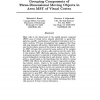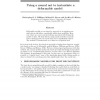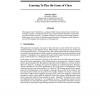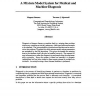NIPS
1994
15 years 3 months ago
1994
160
click to vote
NIPS
1994
15 years 3 months ago
1994
Deformable models are an attractive approach to recognizing nonrigid objects which have considerable within class variability. However, there are severe search problems associated...
107
Voted
NIPS
1994
15 years 3 months ago
1994
The macaque lateral geniculate nucleus (LGN) exhibits an intricate lamination pattern, which changes midway through the nucleus at a point coincident with small gaps due to the bl...
111
Voted
NIPS
1994
15 years 3 months ago
1994
In this paper, we present an improved version of the online phase-space learning algorithm of Tsung and Cottrell (1995), called ARTISTE (Autonomous Real-TIme Selection of Training...
119
Voted
NIPS
1994
15 years 3 months ago
1994
This paper discusses the linearly weighted combination of estimators in which the weighting functions are dependent on the input. We show that the weighting functions can be deriv...
113
Voted
NIPS
1994
15 years 3 months ago
1994
We present efficient algorithms for dealing with the problem of missing inputs (incomplete feature vectors) during training and recall. Our approach is based on the approximation ...
134
Voted
NIPS
1994
15 years 3 months ago
1994
Reinforcement learning addresses the problem of learning to select actions in order to maximize one's performance inunknownenvironments. Toscale reinforcement learning to com...
129
Voted
NIPS
1994
15 years 3 months ago
1994
This paper presents NeuroChess, a program which learns to play chess from the final outcome of games. NeuroChess learns chess board evaluation functions, represented by artificial...
111
Voted
NIPS
1994
15 years 3 months ago
1994




